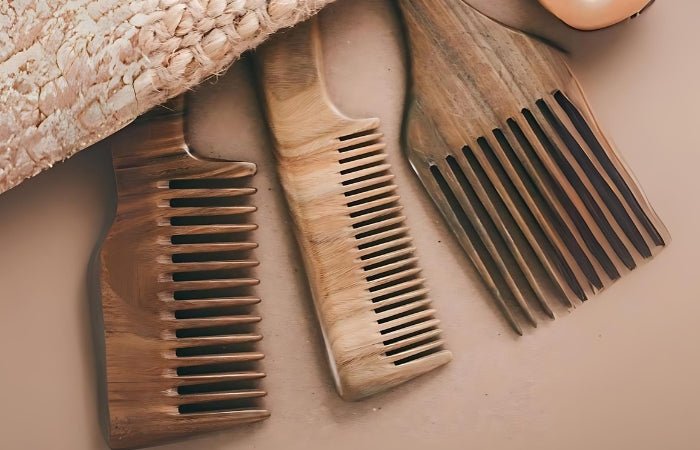Eco-friendly or sustainable hair combs are hair combs made of wooden material and are designed to provide a natural grooming process. Plastic combs, on the other hand, cause damage to the hair and also pollute the environment while wooden combs offer total care for the hair and the environment.
A Wooden hair comb presents many benefits over plastic combs, which is why the transition to wooden combs should be considered. Combining your hair with these recyclable hair combs is not only safe for the environment but also offers your hair and scalp several benefits.
In this blog, we will discuss the seven advantages of wooden hair combs and why they are ideal compared to other types of hair combs in terms of functionality and environmental consciousness.
Natural Material
One of the greatest advantages of wooden hair combs is the material of their manufacture. These combs are made from different forms of wood and do not contain any chemicals that are present in most plastic combs, thus they are eco-friendly.
-
Eco-Friendly:
It is a wise decision to use an environmentally friendly hair comb to cut out the use of plastics and thereby decrease pollution.
-
Sustainable:
Sustainable combs are sourced from natural materials, and this means that their production does not affect the environment in any way.
When you choose a natural material, it means you are making a conscious decision to show support for the environment through sustainable living.
Durability and Longevity
Hear combs made of wood are long-lasting and can be used for many years. The usage of quality wood in their production guarantees that these combs are strong and will not be damaged easily if they are used every day.
-
Long-Lasting:
While plastic combs may break or wear out over some time, an eco-friendly hair comb is designed for longevity.
-
Cost-Effective:
Selecting a hair comb that is long-lasting and eco-friendly will therefore require less replacement in the long run.
Wooden hair comb is beneficial to use for years without having to replace it constantly if it is frequently cleaned and maintained properly.
Gentle on Scalp
Among the numerous advantages associated with wooden hair combs, people love the fact that the wooden comb has minimal effect on the scalp. This wooden comb has round edges that gently glide over the scalp thus avoiding scratching of the skin or even causing damage.
-
Scalp Health:
Wooden hair comb for regular use helps to regulate blood flow in the head region as well as minimize issues like dandruff.
-
Comfort:
Using wooden combs makes hair care to be comfortable by creating a good feel on the hair and scalp.
These combs are designed for the scalp and are not harsh on the skin or any scalp-related conditions.
Anti-Allergenic Properties
Natural wooden hair combs do not irritate hair or scalp similarly to plastic or metal and can be used on all types of hair regardless of their tendency to cause allergic reactions.
-
Hypoallergenic:
The beauty of wooden combs is that they do not contain any chemicals that can trigger allergies in people.
-
Safe:
With no toxic chemical used in the production of the comb, it is safe for use for all people.
By using a sustainable hair comb, one can reduce the incidences of allergy cases and therefore have a safer hair combing process.
Improved Hair Texture
Wooden hair comb is one of the best hair tools that can be used daily as it improves hair texture and health. The natural wood spreads natural oils from the scalp evenly along the hair shaft which makes hair shiny and softer.
-
Moisturization:
Aids in distributing sebum uniformly across the hair, which prevents dryness or frizzy hair.
-
Healthier Hair:
Wooden combs do not cause breakage and split ends like plastic combs, so they help hair become healthier and more potent.
All in all, using a green hair comb is highly recommended for anyone who wishes to have shiny hair without using chemicals.
Aesthetic Appeal
Some of the wooden hair combs are not only useful but also beautiful. These make them fashionable ornaments due to their natural grain and distinct patterns.
-
Stylish:
Wooden combs are available in many designs and give your grooming tool a classic style and look.
-
Unique:
The wooden combs are all different and have different designs on the handle and an array of different textures.
The beauty of a sustainable hair comb makes it a fashionable accessory that is popular among environmentally conscious people.
Reduced Static Electricity
Wooden hair combs do not make your hair stay stiff, unlike plastic combs which lead to the formation of static electricity on the hair.
-
Less Frizz:
Wooden combs do not create static electricity, which means that the hair becomes less frizzy and full of flyaway strands.
-
Smooth Styling:
Enjoy a silky finish to your hair without the electrical interaction that is associated with plastic combs.
To achieve a more sculptured professional finish, a wooden hair comb is preferred because it minimizes static electricity which causes hair to stand up or fuzz.
Conclusion
Using wooden hair combs has many advantages, starting from the effect on your scalp to the quality of your hair structure and the absence of electrification. These are not just ordinary combs: they are eco-friendly products that are both functional and aesthetic and that help people make a conscious, environmentally friendly choice. In choosing a sustainable hair comb, you are on a step to embracing change in your grooming activities as well as the environment.
Are you curious about making the switch? Check out the Brown Living store to get affordable and environment-friendly hair combs. Shop now and enhance your hair care routine with the best sustainable combs available!
Check out Sustainable Wooden Hair Comb:



Share:
Choose All Things Natural and Eco-Friendly This Holi
8 Essential Beard Care Tips Every Man Should Know